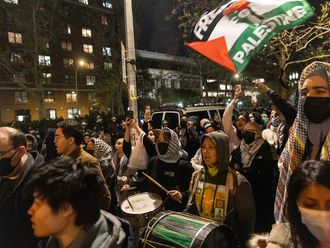An already volatile northeast Asia may be on the brink of more turbulence. Just when you thought it could not get any more unpredictable, reports of internal turmoil suggest the black hole that is North Korea just grew bigger, portending more trouble.
It is not just that Jang Song Thaek, brother-in-law of former leader Kim Jong Il, has been purged and that two of his aides were reportedly part of a wave of public executions.
Jang was widely considered one of the powers behind the throne advising the boy general, Kim Jong Un. Whether or not Jang was a closet reformer, sympathetic to a Chinese-style opening, is likely to be revealed by future developments. But one near certainty is that ill-conceived, erratic and potentially dangerous behaviour looms. If, as appears to be the case, the latest wave of purges (he had already removed a score of senior ageing generals) reflects a consolidation of Kim’s power, we may be in for a wild ride. How else to explain his baffling behaviour?
North Korean officials say they want foreign investment in new special economic zones. But then they shut down the one showcase experiment, the Kaesong Industrial Zone , where South Korean companies have employed 52,000 North Koreans.
Kim builds dolphinariums, amusement parks and a ski slope to encourage tourism, but takes an 85-year-old American tourist hostage because he fought in the Korean war then mysteriously releases him after a purported “confession”.
Then there are Kim’s whimsical priorities for engaging foreigners. While he snubbed Eric Schmidt, the head of Google, he hangs out with US basketball star Dennis Rodman, who is to help coach North Korea’s team. This is on top of reports of a wave of repression, including executions for the “crime” of viewing South Korean movies.
It all seems more like an overgrown spoiled child lacking adult supervision than the leader of a state building intercontinental ballistic missiles (ICBMs) and nuclear weapons. And that, for long-term North Korea watchers, smells like trouble.
Tell-tale signs include reports of activity at a long-range missile site and hints of activity at a nuclear test site. Moreover, South Korean officials have told its parliament that Pyongyang has deployed attack helicopters and rockets in an area near the Northern Limit Line, a disputed sea border west of the Korean coast.
Sound familiar? These are all time-honoured North Korean provocations designed to win attention, boost the military and serve as blackmail for aid. Pyongyang has been trying for many years to perfect an ICBM, most recently a road-mobile one, so far with modest success.
There are also fears that the North, the only nation to stage a nuclear test in the 21st century, may be considering a fourth test. And if it provokes a military clash with Seoul, it would be an encore to the sinking of the Cheonan, which appeared to have been hit with a torpedo in 2010.
North Korean provocation is also intended to create a climate of siege in order to tighten internal control, which is said to be happening now. Similar behaviour was seen in March, when Kim told foreign embassies to evacuate because war was about to break out.
Any such developments would also underscore that Kim is faithfully backing the “military first” policies of his father. If the recent internal purges reflect a power struggle, they may have been over efforts by some to reallocate resources enjoyed by the military.
In any case, this all bodes for still more volatility in northeast Asia. New missile or nuclear tests would put more pressure on China to cut off its client in Pyongyang and further test US-China relations. Similarly, a naval clash risks undermining South Korean President Park Geun-hye’s “trust-building” efforts, a tough transactional approach to North-South relations — and, more troubling, provoking a South Korean response that could easily escalate.
While hard facts about events in North Korea remain scarce and unreliable, it has been a pattern that when Pyongyang is out of the spotlight for a while, it finds a way to make headlines. Stay tuned.
— Financial Times
The writer is a senior fellow of Atlantic Council and Brent Scowcroft Centre.








